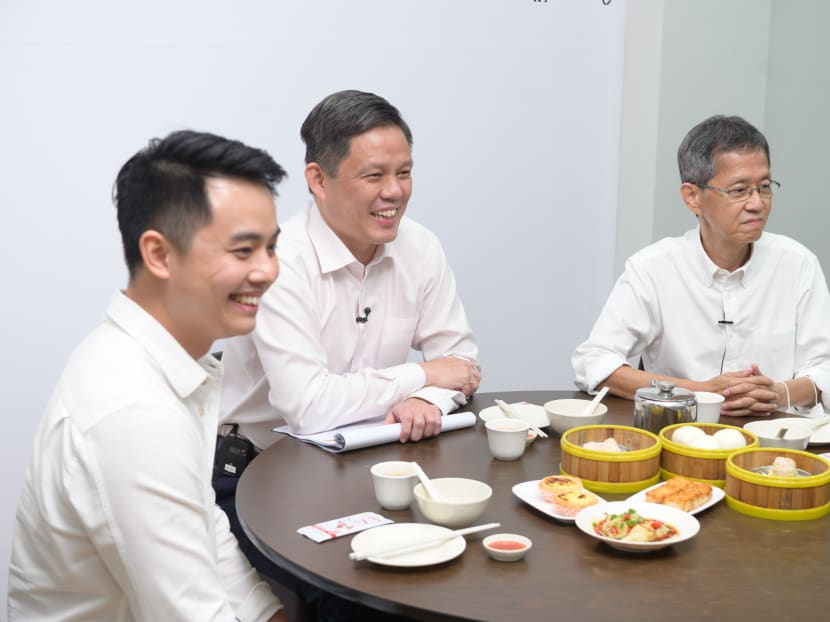Innovate now and don’t wait for Covid-19 to blow over, Chan Chun Sing urges food services firms
SINGAPORE — The authorities hope to lift the economic contribution of the food services sector, which employs 5.5 per cent of the workforce but accounts for just 1.1 per cent of gross domestic product (GDP), Trade and Industry Minister Chan Chun Sing said on Monday (Nov 30).

Trade and Industry Minister Chan Chun Sing (centre) during a visit to Swee Choon Tim Sum Restaurant in Jalan Besar on Nov 30, 2020.
- Trade and Industry Minister Chan Chun Sing hopes that the food services sector can contribute more to Singapore’s GDP
- He said that restaurants and catering operators should not wait for Covid-19 to “blow over” but find ways to innovate during the crisis
- They should also seek new business models such as decentralised kitchens and the development of ready-to-eat products
SINGAPORE — The authorities hope to lift the economic contribution of the food services sector, which employs 5.5 per cent of the workforce but accounts for just 1.1 per cent of gross domestic product (GDP), Trade and Industry Minister Chan Chun Sing said on Monday (Nov 30).
“Our hope is that with the 5 per cent of the workforce, we will be able to grow the value-add to the Singapore GDP much more than the current 1.1 per cent,” Mr Chan said in a virtual media conference during his visit to Swee Choon Tim Sum Restaurant in Jalan Besar.
Mr Chan added that food service businesses — which include restaurants and catering operators — should not wait for the Covid-19 pandemic to “blow over” but find ways to innovate during the crisis.
He added that while many food services companies are “on a path of steady recovery” with revenues back to around 70-80 per cent of pre-Covid sales, the recovery remains slow for some segments, including outlets in the central business district and tourism-focused areas, as well as catering companies.
“Those who have done well are establishing the foundations now in the midst of Covid-19 for the recovery,” he said. “And those who have been bold to experiment and to try are already on the path of recovery, compared to those who might be still waiting for the Covid to blow over.”
Citing the example of Swee Choon, Mr Chan noted that the homegrown brand had taken measures to expand its customer base by offering enhanced food delivery services since the circuit breaker period.
It had also added set menu options to its delivery menu to make it easier for customers to hit the minimum spending needed for islandwide delivery.
These efforts helped the business increase its sales via food delivery from less than 1 per cent to 60 per cent of its existing average revenue during the circuit breaker.
The restaurant also tapped Enterprise Singapore’s (ESG) food delivery booster package that was launched in April to help subsidise delivery costs.
To date, more than 13,000 establishments have benefited from this package, Mr Chan added.
More companies are also looking to digitalise their services under the Productivity Solutions Grant within the F&B sector, which has seen more than four times the number of applications from January to October this year compared to the same period last year.
Beyond just digitalising food services, food services operators should also test out new business models, said Mr Chan.
For instance, with the data it has gathered from its deliveries, Swee Choon has also opened a decentralised “cloud kitchen” at Tampines. The firm had observed that a sizeable number of its deliveries hailed from the area.
The facility ensures that residents living in the east can experience quicker deliveries with food being prepared closer to their homes. The firm plans to open two more cloud kitchens — one in the north and one in the west.
Other firms such as catering company Le Rainbow are partnering with the Food Innovation and Resource Centre — a joint initiative by ESG and Singapore Polytechnic — to develop ready-to-eat products targeting dormitory workers and the elderly to increase its revenue streams, given restrictions on buffets.
Mr Chan added that the food services sector will have to innovate during the crisis rather than waiting until afterwards in order to weather the storm.
“If you look at Swee Choon’s model, they are not saying that ‘okay, I make all these plans, so that maybe in one year's time, in two years’ time when the Covid situation recovers (and) when the tourists come back then I will expand,’’ he said.
“In fact, Swee Choon is now making the plans to continue to serve its customers, both inside and outside Singapore, amid Covid.
“If they can do this successfully, they have established the foundations for themselves to recover now and not waiting for the future to come.”
Mr Chan added that homegrown brands should also aim to expand overseas after they have established a sizeable presence here.
“While times are tough, there is actually a demand for high quality and safe products throughout Asia,” he said. “That’s why this is as much an opportunity as much as it is a challenge to go overseas.
“Before we go overseas, we must make sure that the brand is well-established in Singapore as well… whether people buy (homegrown brands) overseas, many of them will (do so) by word of mouth where they have come to Singapore and have experienced the food products and services from (those brands) and bring it back.”











